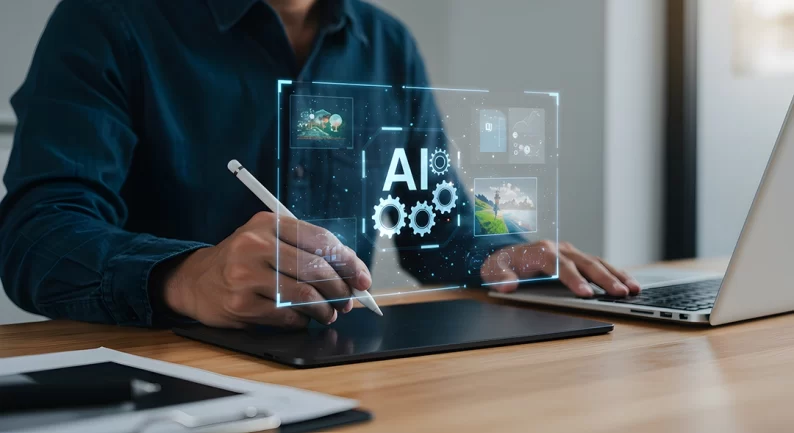How AI is Transforming ERP for Smarter Business Decisions
05 Sep 2025 | by Cooper Mundell
Artificial Intelligence (AI) is reshaping how businesses operate and make decisions, bringing speed, insight, and adaptability to every process. At the same time, Enterprise Resource Planning (ERP) systems provide the central framework that unites finance, operations, supply chain, HR, and more. When AI is integrated with ERP, it turns data into actionable intelligence, helping organisations work smarter, operate more efficiently, and respond quickly to a constantly evolving business environment.
In this blog, we’ll explore how AI is transforming ERP, what benefits it delivers, and why now is the time to embrace this technology.
-
AI-Driven Insights for Better Decisions
Traditional ERP systems already centralise data from across the business. But with AI built in, that data becomes even more valuable. Machine learning models can spot patterns, trends, and anomalies that might be invisible to the human eye. For example, AI can forecast sales demand with greater accuracy, identify inefficiencies in supply chains, or highlight unusual financial transactions that may need review.
The result? Leaders can make faster, evidence-based decisions with greater confidence.
-
Automation That Frees Up Time
AI enables ERP systems to take over repetitive, time-consuming tasks. Think invoice processing, expense categorisation, or data entry. Instead of employees spending hours on manual tasks, AI automates them with speed and accuracy. This not only reduces errors but also allows your teams to focus on higher-value activities such as strategy, innovation, and customer engagement.
-
Predictive Capabilities
ERP powered by AI goes beyond reporting on what has happened — it predicts what is likely to happen next. For example:
-
Finance: Predicting cash flow issues before they arise.
-
Operations: Anticipating equipment failures through predictive maintenance.
-
Supply Chain: Forecasting potential disruptions to adjust procurement strategies in advance.
This proactive approach transforms ERP from a system of record into a system of foresight.
-
Personalisation and Better User Experience
AI brings intelligence to the user experience within ERP platforms. It can learn user behaviour and suggest next steps, automate workflows based on individual roles, or even provide natural language search so employees can ask questions like “What’s our revenue forecast for next quarter?” and receive instant answers.
By reducing complexity and making ERP more intuitive, AI helps increase adoption across the business.
-
Agility in a Changing World
Markets are changing faster than ever — whether it’s global disruptions, supply shortages, or shifts in customer expectations. AI-powered ERP gives businesses the agility to respond quickly by providing real-time insights and recommending actions. Companies can adapt strategies faster, minimise risk, and seize new opportunities ahead of the competition.
AI & ERP Use Cases
Here are some practical ways businesses are leveraging AI in ERP systems today:
-
Demand Planning: AI predicts customer demand based on historical trends, seasonal fluctuations, and external market factors, helping businesses maintain optimal inventory levels.
-
Inventory Optimisation: Machine learning algorithms identify slow-moving stock, prevent overstocking, and reduce waste.
-
Sales and Order Automation: AI automates quote generation, order approvals, and customer follow-ups, improving sales cycle efficiency.
-
Financial Analysis: AI detects anomalies in invoices, expense claims, and transactions to prevent fraud and ensure compliance.
-
Workforce Management: Predictive scheduling tools optimise staffing levels based on historical data and future forecasts.
-
Customer Insights: AI analyses purchasing patterns, enabling personalised recommendations and promotions.
-
Maintenance and Operations: Predictive maintenance alerts prevent equipment downtime, ensuring smooth production operations.
These use cases illustrate the versatility of AI-powered ERP across finance, operations, sales, HR, and supply chain management.
Why Now?
ERP systems are already a vital part of business operations, but adding AI takes them to the next level. Organisations that adopt AI-enabled ERP can move faster, make smarter decisions, and build resilience in uncertain times.
If you’ve been considering modernising your ERP, now is the time to explore how AI can amplify its value.
Conclusion
AI is not replacing ERP — it’s supercharging it. Together, they create a powerful platform for innovation, efficiency, and growth. Businesses that act early to embrace this transformation will be better positioned to lead in their industries.





Leave a comment